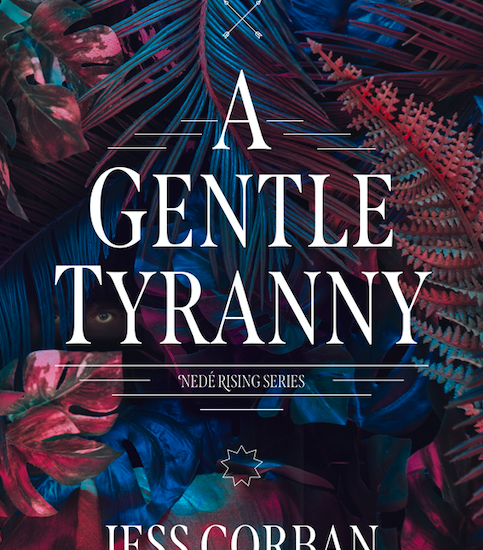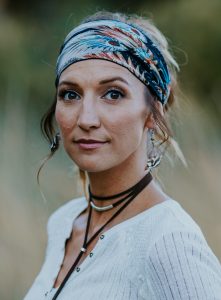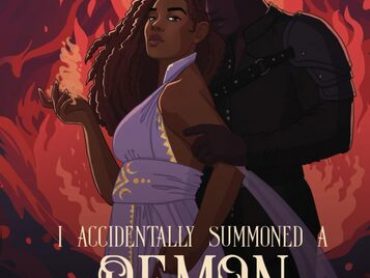Jess Corban graduated college with a degree in communications and, perhaps more instructive, thirteen stamps in her passport. After college, a chance interview at a small publisher for an even smaller position sparked a love for writing that turned into twelve nonfiction books (under various pseudonyms). Now Jess lives with her husband and two daughters in the Sierra Nevada Mountains of California, where she finds inspiration in a sky full of stars and hiking the Canyon of the Kings. A Gentle Tyranny is her debut novel.
Jess Corban’s debut novel presents a new twist to the dystopian genre, delivering heart-pounding action, thought-provoking revelations, and a setting as lush as the jungles of Central America.
YEM was able to speak with Jess about her favorite authors, others reading her work, and her writing process.
Young Entertainment Mag: When did you first fall in love with writing?
Jess Corban: I have a picture of two-year-old me tapping away at my mom’s old typewriter—ha!—but I think I fell in love with writing in sixth grade, when I had to write a creative expression piece for English class. My essay was sappy and soaked with clichés, but playing with words and learning to evoke emotion with them became an addiction.
YEM: What is your favorite thing about writing?
Jess: In his book On Writing, Stephen King claims writing is akin to real-life telepathy. I agree. I mean, I type some symbols into a metal box that get printed onto paper, you look at them and experience what I dreamed up in my mind. That’s pretty cool.
YEM: What does it mean to you to have others read your work?
Jess: Like any artist, having someone experience what you create is simultaneously thrilling and terrifying! To do it without losing your mind takes both vulnerability and thick skin. But I don’t think I’ll ever lose the gratitude I feel every time I hear someone purchased or loaned one of my books and took the time to read it. We’re all busy people and there are millions of books out there. That they would choose mine is a gift.
YEM: Who are some of your favorite authors?
Jess: Mark Twain, Avi, C.S. Lewis, and more recently, Suzanne Collins and Adrienne Young.
YEM: What is the most important thing to you when you are creating characters?
Jess: Emotional depth. They don’t have to think like me or even behave themselves, but I want to know—and I want readers to know—what makes them tick.
YEM: Do you have any tips for people who aspire to become writers?
Jess: Whether writing fiction or nonfiction, the timeless advice of my college writing professor still stands: Writers write. The first hundred thousand words or so are rarely any good—mine certainly weren’t!—so flush them out any way you can by writing articles, short stories, fan fiction, journal entries, novellas, etc. That helps you find your voice. Second piece of advice is to have thick skin. The only way to grow as a writer is to accept critique and learn from it. It’s never fun to hear something you wrote didn’t have the intended effect, but better to hear that while you can do something about it than post-print.
YEM: What does your writing process look like?
Jess: Once I have an idea, I plan it out to make sure it has good bones. I like to have an idea of how a story will end before I even begin. It may change along the way, but having a goal informs big literary decisions along the way, which I’ve found minimizes the need for major rewrites. Once I have a plan, all I need is a quiet space, a fresh mind, and my trusty Scrivener program to make some magic.
YEM: What has been the most useful thing someone has told you in regards to writing?
Jess: To sit my butt in a chair and not get up until I’ve written some words! It’s so easy to get distracted and procrastinate, but once you get some words written, they tend to multiply and the going gets easier.
YEM: What is a book that has shaped your life?
Jess: Proverbs, which is a book in the Bible written by a man named Solomon. Even if you’re not a religious person, he had some really wise advice for living life well.
YEM: Does creating characters and worlds for these characters to live in come easily to you? What’s different about your dystopian world that hasn’t been done before?
Jess: I enjoy creating characters and worlds, but I wouldn’t say it comes easy. It took me four years to write this series! As for what’s unique about Nedé, it’s rooted in a blending of cultures and races from around the world, so you get this very inclusive, diverse sisterhood. Although prejudices unfold, they manifest a bit differently than the tensions we see today. And rather than take a futuristic dystopian approach, I think readers will find the more rural ambiance, combined with Latin flair and horses, fresh and inviting.
YEM: What have you learned about yourself through writing?
Jess: Honestly, that I’m more tenacious than I realized. I remember the very first day I sat down to begin the book that would become A Gentle Tyranny, over four years ago. Watching that cursor blink on the blank page felt akin to someone dumping an enormous pile of bricks in front of me and saying, “Build a house.” I was overwhelmed with the size of the project and the time it would take. I read books on writing and good books for reading. I sat my butt in the chair even when eking out words was more painful than a trip to the dentist. I asked for honest feedback and incorporated suggestions. I murdered my darlings. There were many days I was tempted to give up. But I didn’t. And now… now I get to share something I’m proud of. Something of beauty. Something people are reading and actually loving!
YEM: What do you hope others can learn from or take away after reading your book?
Jess: I prefer to take a story-first approach and let any themes develop naturally. In other words, I didn’t come to this story with an agenda. But as I wrestled the initial question onto the page, some very organic refrains began to surface—the corrupting nature of unchecked power, the unique strengths men and women each possess, the age-old debate over whether the ends justify the means, to name a few. I hope readers will be challenged by the questions raised—as I was!—even as they’re immersed in the story.





